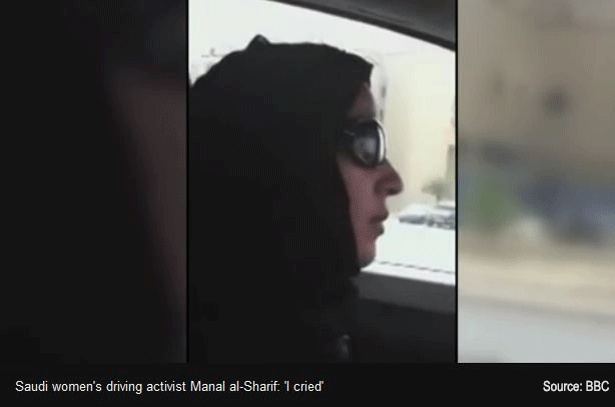
by Lil Tuttle
“The king of Saudi Arabia has issued a decree allowing women to drive, bringing to an end the country’s dubious distinction as the only place on earth banning the practice,” the BBC reported this week. The royal order—to be put into effect by June 24, 2018—awaits ministerial action to give advice on its implementation.
Rights groups in the kingdom have campaigned for years to allow women to drive, and some women have been imprisoned for defying the rule.
Advocates cheered when they heard the news of the king’s decree.
Campaigner Sahar Nassif told the BBC: “I couldn’t believe it. I started laughing and jumping and screaming. It’s a great victory.
I’m going to buy my dream car, a convertible Mustang, and it’s going to be black and yellow!”
It’s a very welcome victory for Saudi women, although a small one in the larger scheme of patriarchal oppression of women in that kingdom.
Saudi law enforces a strict form of Sunni Islam know as Wahhabism and is known for its gender segregation rules.
Women have to adhere to strict dress codes, must not associate with unrelated men, and if they want to travel, work or access healthcare they must be accompanied by – or receive written permission from – a male guardian.
Saudi Arabia’s cradle-to-grave male guardianship system—based on the country’s strict interpretation of Islamic sharia law—may still prevent some women from getting behind the wheel of a car.
The BBC reported that the “country’s US ambassador, Prince Khaled bin Salman, confirmed that women would not have to get male permission to take driving lessons, and would be able to drive anywhere they liked.” However, it is not known yet whether or not a woman will need her male guardian’s permission to actually obtain a driver’s license.
How bad do women under strict Islamic sharia law have it? Find out in our short booklet, “Sharia Law: Legalized Misogyny.”
Currently, women must get permission from their male guardian for many ordinary life decisions, including such things as getting married, opening a bank account, or applying for a passport or national ID card.
The guardianship system has been criticized strongly, including by the organization Human Rights Watch, which said it effectively turns women in to “legal minors who cannot make key decisions for themselves.”
These women are genuine victims of patriarchal oppression who deserve the respect and support of women worldwide, unlike the pampered fake victims who played dress-up in the 2017 Women’s March in the US:

